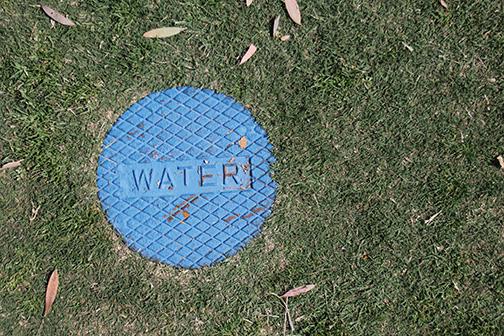San Diego State has taken steps to reduce water usage following recent warnings and mandated water restriction related to the ongoing California drought.
Fountains have been turned off and the sprinklers don’t to run during the day, Bill Lekas, SDSU’s energy manager of 33 years, said. Adjustments have also been made to reduce the amount of turf on campus, limiting or removing it if possible. Last semester, many plants around campus were removed and replaced with drought-tolerant plants to comply with the water restriction standards.
At the Conrad Prebys Aztec Student Union two 50,000-gallon tanks collect rainwater that gets reused.
Where bushy plants were found in “Sycamore Quad” last year, there are now small native grasses surrounding the trees in the planters.
Irrigation accounts for 16 percent of the total water usage on SDSU’s campus, and the bulk of water use goes toward industrial needs on campus, such as generating electricity, Lekas said.
Gov. Jerry Brown issued an executive order earlier this month imposing a water-use restriction to limit the state’s usage by 25 percent to levels found in 2013.
The order requires that the State Water Resources Control Board implement measures to meet this goal, including requiring campuses across the state to limit water in more aggressive ways.
Madeline Baer, political science assistant professor at SDSU, said Brown’s drought package, which encompasses measures that will be taken on various government levels throughout the state, requires farms to report on their water use and their drought plans. Some of these farms, however, continue to plant water-intensive crops for export, and use flood irrigation instead of low-water-intensive irrigation methods that would conserve water.
The California water restrictions do not regulate agriculture or corporate water brands, which largely contribute to rapidly depleting water sources.
Californians are being given restrictions on when they can water their lawns, but hydraulic fracturing and other forms of oil extraction that pollute California’s groundwater continue to go unregulated.
According to Brown’s executive order, action will also be taken to:
- Replace 50 million square feet of lawns throughout the state with drought tolerant landscaping in partnership with local governments;
- Direct the creation of a temporary, statewide consumer rebate program to replace old appliances with more water and energy efficient models;
- Require campuses, golf courses, cemeteries and other large landscapes to make significant cuts in water use; and
- Prohibit new homes and developments from irrigating with potable water unless water-efficient drip irrigation systems are used and ban watering of ornamental grass on public street medians.









